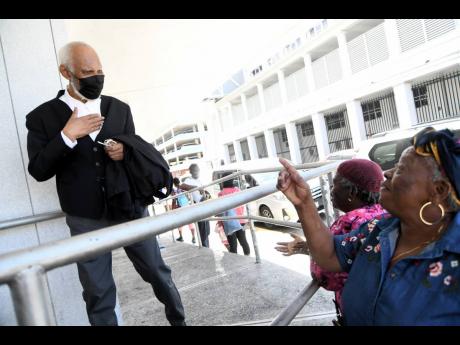Finger off the trigger
Knight, Bunting back pulling security minister powers on gun permits but Derrick Smith differs
Two People’s National Party-aligned former national security ministers have backed the scrapping of ministerial authority in the approval of gun licences on review amid a firestorm that has cost the Andrew Holness administration a Cabinet member.
Attorney-at-law K.D. Knight, a former minister of national security in the P. J. Patterson-led administration, is batting for the removal of Section 37A (3), (4) of the Firearms Act that is under review by Parliament.
The section outlines the role of the minister of national security as receiving and considering the reports of the review board, and upon review, directing the Firearm Licensing Authority’s (FLA) board “as the minister may think fit” in relation to firearm user licence applications.
Knight, in a Gleaner interview on Monday, said removing the provisions would insulate ministers from future controversies, amid the troubling findings of the Integrity Commission’s special report tabled in Parliament last Tuesday on the questionable operations of the FLA between 2012 and 2018.
Peter Bunting who, along with Robert Montague, has been embroiled in the unfolding scandal, has said, too, that the provision ought to be removed.
However, the two men’s political counterpart, Derrick Smith, who served as security minister between September 2007 and May 2008 when Bruce Golding was prime minister, has cautioned against any “knee-jerk” reaction. He said that decision-making is reliant on the “character, integrity and strength of the minister”.
Knight has argued that the final decision following gun permit appeals should not rest with the minister, noting that the process can prove tiresome.
“I had to exercise that jurisdiction once, and it’s tedious, because I held hearings. The applicants would come before me and 90 per cent of the time with their lawyers. I would cross-examine them quite frankly before my decision,” he told The Gleaner.
Knight concluded that the task was onerous after grilling an appellant whom he ultimately denied a permit.
“When I was finished with him, I said to him, ‘If you were sitting where I am sitting, would you allow this appeal?’ He said, ‘No, sir,’ and I said, ‘Appeal refused,’” Knight recalled.
He said while the minister is in charge of the FLA and “cannot just be seen as a figurehead”, insulation from the appeal process could diminishes public scepticism and help build trust.
The lawyer said where the board of the FLA and the review board deny an applicant, a three-member apolitical committee appointed by the minister and approved by Cabinet should review those decisions, deliberate, and make the final decision.
Bunting, who the Integrity Commission report said approved permits for two applicants with questionable character, said in a radio interview on Nationwide News Network on Monday that he does not think the final decision should come from the holder of the security portfolio.
He sits on Parliament’s joint select committee which is currently reviewing the new Firearms Bill.
“In hindsight, I can tell you, it would have made my life much easier if the minister had no role in it,” Bunting said.
“My own view is that it might be better to just have the appeal made to that review board and whatever they rule stands.”
But Smith, in a Gleaner interview on Monday, said the provision should not be struck down on the basis that the minister makes a decision after considering the position of the review board, recommendations, and other available information.
“We have current situations with two former ministers that they have made some decisions which are proven ought not to have been taken, but there are some issues which, perhaps, not highlighted where a minister would have veered from a recommendation of the review committee and has proven to be a correct decision,” said Smith.
He suggested that removing the provisions would further feed into the narrative of public mistrust of politicians.
“We have people in office and we must respect not only the individual but the office they hold,” he said.
Bunting, who was national security minister from 2012 to 2016, was cited in the report for granting a licence to a man whose United States records for drug trafficking were expunged. The other concerned another man who was never charged for that matter. An assault case against him was dismissed, and the judge made no orders in another.
The report said Montague, who was minister of national security between 2016 and 2018, overturned applications that had either been denied or permits revoked for six persons whose criminal past ranged from lottery scamming, to drug trafficking, to illegal gun possession.
He has since resigned as minister without portfolio in the Ministry of Economic Growth and Job Creation but has, however, said the Integrity Commission’s report “is grossly misrepresentative and incomplete”.
Meanwhile, Bunting, the leader of opposition business in the Senate, said the firearm review board had recommended that the licences be granted or restored, and as minister, he acted either in accordance with their recommendations or more conservatively.
There have been strident calls from civil-society lobbies for his resignation.

